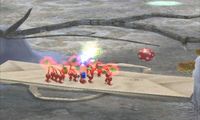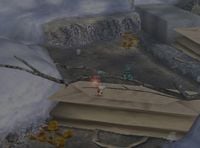Paper bag: Difference between revisions
GreenPikmin (talk | contribs) No edit summary |
|||
| Line 9: | Line 9: | ||
The small symbol found on top of the paper bags, the word {{j|紙|Kami|Paper|f=tp}} inside a stylized ellipse, is used in Japan to represent paper recycling.{{cite web|http://en.wikipedia.org/wiki/Recycling_in_Japan#Symbols|Recycling in Japan|Wikipedia}} | The small symbol found on top of the paper bags, the word {{j|紙|Kami|Paper|f=tp}} inside a stylized ellipse, is used in Japan to represent paper recycling.{{cite web|http://en.wikipedia.org/wiki/Recycling_in_Japan#Symbols|Recycling in Japan|Wikipedia}} | ||
According to game files, paper bags are in fact a [[seesaw block]] with a different appearance and nothing to push it back up. | According to game files, paper bags are in fact a [[seesaw block]] with a different appearance and nothing to push it back up.<ref group="note">Both objects have the same internal name "seesaw", however paper bags are configured to behave as obstacles that can be "destroyed" such as gates and clogs, whereas seesaw blocks are configured as objects that return to their initial state each day.</ref> | ||
==''Pikmin 3''== | ==''Pikmin 3''== | ||
| Line 73: | Line 73: | ||
*[[Cardboard box]] | *[[Cardboard box]] | ||
*[[Seesaw block]] | *[[Seesaw block]] | ||
== Notes == | |||
<references group="note"/> | |||
==References== | ==References== | ||
Revision as of 22:41, August 8, 2023
|
This article or section is in need of more images. Particularly: |
Paper bags are two different types of obstacles in Pikmin 2 and Pikmin 3. They stand as obstacles in pathways; in Pikmin 2, they need to be compressed to open up the areas past them, while in Pikmin 3 they must be pushed off a ledge and serve as a ramp when they drop.
Pikmin 2
Paper bags in Pikmin 2 resemble plain brown grocery bags that compress and expand using their bellows-like sides. They appear upside-down and slightly compressed, but can be squashed completely by throwing Pikmin on top of the bag so that it is weighed down. Different bags need different weight in order to fully succumb, and until that weight requirement is met, the bag will not change size at all. Purple Pikmin, of course, weigh ten, and Pikmin of other types weigh one. The first paper bag is found on the first day of Pikmin 2, where Captain Olimar and Louie must flatten it to reunite.
The small symbol found on top of the paper bags, the word 紙? (lit.: "Paper") inside a stylized ellipse, is used in Japan to represent paper recycling.[1]
According to game files, paper bags are in fact a seesaw block with a different appearance and nothing to push it back up.[note 1]
Pikmin 3
In Pikmin 3, paper bags appear as blue shopping bags. Their opening is closed, meaning that the bags form a triangular shape from their base to their top. These bags are found lying on their side, which means their rectangular bases act as walls, and their slanted sides act as ramps. These are always found with their opening facing a ledge, and they need to be pushed off of it from their base. When they fall down, they act as ramps to the tunnel they were pushed from, serving as shortcuts. All paper bags require 10 Pikmin to push them, minimum. Once they begin pushing it, a cutscene plays; this happens for all paper bags. Pikmin standing below the ledge a bag is pushed from will not be crushed by it; instead they will just be pushed out of the way.
Locations
Pikmin 2
- Valley of Repose
- A bag that requires 15 Pikmin separates Olimar and Louie at the start of the game. Both leaders must use their respective Pikmin to flatten it.
- A second paper bag requires 35 Pikmin and is close to the first one. It cannot be flattened on the first day, and is the first thing that should be done on the second day (after growing enough Pikmin).
- Awakening Wood
- There is a paper bag on the way to the White Flower Garden that requires the equivalent of 200 Pikmin. Purple Pikmin from the Emergence Cave and/or the Hole of Beasts are required.
Pikmin 3
- Garden of Hope
- A paper bag is located in the cave northeast of the landing site. It connects the northernmost part of the cave with the easternmost.
- Distant Tundra
- The passageway leading from the Vehemoth Phosbat's chamber leads to a paper bag, which then leads back to the landing site.
- Tropical Wilds
- A paper bag is at the beginning of the path to the Sandbelching Meerslug's arena. To get to it, the player must throw two leaders and 10 Pikmin onto a tree stump, then a leader on the tree stump must throw the other leader and the Pikmin.
- Twilight River
- There is a paper bag located to the west of the landing site. To get to it, the player must ride a lily pad to the southwestern part of the area, then go up a slope once they get off the plant. They need to keep walking until they reach the paper bag.
- Another paper bag is located to the south of the landing site, just north of the Burrowing Snagret's arena.
- Formidable Oak
- The paper bag here is in the first large part of the stump's interior. The bag is to the west of the large crystal with fragments in it.
Pikmin 3 Deluxe
- Big Fruit Carnival
- A paper bag is located at the same place it appears in the Garden of Hope.
Names in other languages
| Language | Name | Meaning |
|---|---|---|
| 紙袋? Kamibukuro |
Paper bag | |
| Papiertüte | Paper bag | |
| Sacchetto di carta | Paper bag | |
| Bolsa de papel | Paper bag |
Gallery
A paper bag in Pikmin 3, in the Formidable Oak. Notice the "10" on it, which indicates the number of Pikmin needed to push it.
Trivia
- Much like with seesaw blocks, if a leader in Pikmin 2 ends up on top of a non-compressed paper bag, for instance, with the use of glitches, and there are no Pikmin on top of it, pausing the game will make the fraction numbers appear, revealing the leader's weight to be 0.
- When it rains in Pikmin 3, rain droplets can be seen dripping down the surface of paper bags.
See also
Notes
- ^ Both objects have the same internal name "seesaw", however paper bags are configured to behave as obstacles that can be "destroyed" such as gates and clogs, whereas seesaw blocks are configured as objects that return to their initial state each day.
References
- ^ Recycling in Japan on Wikipedia
| Obstacles |
|---|
|
|
| Minor obstacles |








